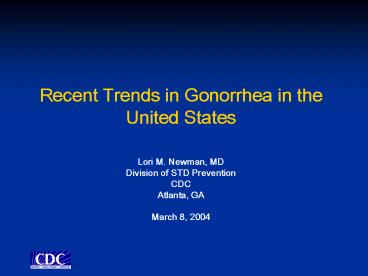Recent Trends in Gonorrhea in the United States - PowerPoint PPT Presentation
1 / 24
Title:
Recent Trends in Gonorrhea in the United States
Description:
Recent Trends in Gonorrhea in the United States. Lori M. Newman, MD. Division of STD Prevention ... Increases risk of HIV transmission and acquisition ... – PowerPoint PPT presentation
Number of Views:75
Avg rating:3.0/5.0
Title: Recent Trends in Gonorrhea in the United States
1
Recent Trends in Gonorrhea in the United States
- Lori M. Newman, MD
- Division of STD Prevention
- CDC
- Atlanta, GA
- March 8, 2004
2
Neisseria gonorrhoeae
- Sequelae of untreated infection include
- Pelvic inflammatory disease
- Infertility
- Chronic pelvic pain
- Increases risk of HIV transmission and
acquisition - Gonorrhea is second most common reported
notifiable disease
3
Gonorrhea rates, U.S., 1970-2003
Rate (per 100,000 population)
500
Gonorrhea rate
2010 Objective
400
300
200
100
0
1970
73
76
79
82
85
88
91
94
97
2000
03
Preliminary 2003 data
4
Gonorrhea rates by sex, 1981-2003
Rate (per 100,000 population)
600
Male
480
Female
2010 Objective
360
240
120
0
1981
83
85
87
89
91
93
95
97
99
2001
03
Preliminary 2003 data
5
Gonorrhea rates by age and sex, 2003
Preliminary 2003 data
6
Gonorrhea rates among females by age, 1981-2003
Rate (per 100,000 population)
1,500
1,200
15-19
900
20-24
600
25-29
300
30-34
0
1981
83
85
87
89
91
93
95
97
99
2001
03
Preliminary 2003 data
7
Gonorrhea rates among males by age, 1981-2003
Rate (per 100,000 population)
2,000
20-24
1,600
1,200
15-19
800
25-29
35-39
400
30-34
40-44
10-14
0
1981
83
85
87
89
91
93
95
97
99
2001
03
Preliminary 2003 data
8
Gonorrhea rates by state U.S., 2003
Preliminary 2003 data
Note The Healthy People 2010 objective for
gonorrhea is 19 cases per 100,000 population
9
Gonorrhea rates by county U. S., 2003
Preliminary 2003 data
Note The Healthy People 2010 objective for
gonorrhea is 19 cases per 100,000 population
10
Gonorrhea rates by region, 1981-2003
Rate (per 100,000 population)
600
480
South
360
Midwest
240
West
Northeast
120
2010 Objective
0
1981
83
85
87
89
91
93
95
97
99
2001
03
Preliminary 2003 data
11
Gonorrhea rates by race/ethnicity, 1981-2003
Rate (per 100,000 population)
2,500
Black
2,000
1,500
1,000
500
Hispanic
American Indian/Alaska Native
White
0
1981
83
85
87
89
91
93
95
97
99
2001
03
Preliminary 2003 data
12
Gonorrhea rates by race/ethnicity, 1981-2003,
excluding blacks
Rates (per 100,000 population)
American Indian/Alaska Native
Hispanic
White
Asian/Pacific Islander
Preliminary 2003 data
13
Ratios of minority gonorrhea rates to white
rates,1981-2003
Rate ratio
Black
American Indian/Alaska Native
Hispanic
Asian/Pacific Islander
Preliminary 2003 data
14
Gonorrhea rates for 15-19 year old females by
region and race/ethnicity, 2003
Rate (per 100,000 population)
Preliminary 2003 data
15
Gonorrhea rates for 20-24 year old males by
region and race/ethnicity, 2003
Rate (per 100,000 population)
Preliminary 2003 data
16
Gonorrhea Positivity among 15-24 year old
females tested in family planning clinics by
state, 2002
0.6
2.7
VT
0.2
NH
0.1
1.0
0.4
MA
0.7
0.9
RI
0.6
1.2
CT
0.8
1.5
1.2
0.2
1.8
NJ
1.3
0.9
0.5
2.8
DE
0.7
0.9
MD
0.7
DC
1.2
0.7
0.7
1.5
0.7
1.4
2.4
2.3
2.8
(n 15)
1.0
(n 21)
2.4
0.6
(n 10)
0.6
(n 7)
0.1
Less than 500 females tested
17
Proportion of reported gonorrhea cases from STD
clinics by sex,1984-2003
from STD clinics
Males
Females
Preliminary 2003 data
18
Proportion of reported gonorrhea cases by source
and sex, 2003
Preliminary 2003 data
19
Average completeness of gonorrhea reporting,
U.S., 2002
99.8
98.3
96.5
75.9
71.5
32.6
19.5
Proportion calculated for women only
20
Data limitations
- Incomplete reporting
- Reporting bias towards STD clinics
- Limited type of data available
- Difficult to distinguish between changes in
screening reporting practices versus changes in
burden of disease
21
Summary
- Males females
- High rates among adolescents young adults
- Decreases in South
- Decreases among blacks
- Increased reporting by private sector
- Insufficient information on risk behavior at a
national level
22
Future data improvements
- NEDSS and STD Program Area Module
- NETSS collection of sex of partner info
- OASIS Project
23
Acknowledgements
- Data and Statistics Management, Division of STD
Prevention, CDC - Sharon Clanton
- Michael Phillips
- Emmett Swint
- Epidemiology and Statistics Branch, Division of
STD Prevention, CDC - Hillard Weinstock
24
Contact information
Lori Newman, MD Epidemiology and Surveillance
Branch Division of STD Prevention Centers for
Disease Control and Prevention Atlanta, GA
30307 (404) 639-6183 len4_at_cdc.gov































